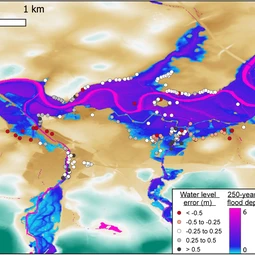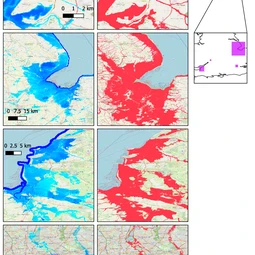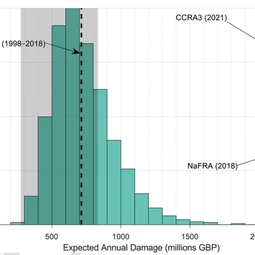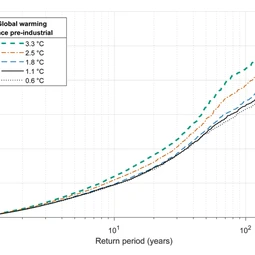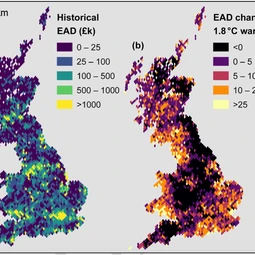Scientists find clear evidence to make flood risk a bigger international priority
7 March 2023
MUNICH: Annual damage caused by flooding in the United Kingdom (UK) could increase by more than a fifth over the next century because of climate change unless all international pledges to reduce carbon emissions are met, according to new research.
The study, led by the University of Bristol and global water risk modelling leader Fathom, reveals the first-ever dataset to assess flood hazard using the most recent Met Office climate projections which factor in the likely impact of climate change. The study was published today in the European Geosciences journal Natural Hazards and Earth System Sciences.
According to these new findings, the forecasted annual increase in national direct flood losses – defined as physical damage to property and businesses – due to climate change in the UK can be kept below 5% above recent historical levels. But this is only on the proviso that all countries fulfil the ambitious pledges they signed up to at the United Nation’s COP26 and also that countries, including the UK, which made further Net Zero commitments, actually achieve these on time and in full.
Timely warning to UK and the world
If the COP26 and Net Zero promises are not collectively met, the study shows the annual cost of flooding in the UK over the next century could grow by between 13% and 23%, depending on different levels of climate extreme projections.
Lead author Paul Bates, Professor of Hydrology and Chairman of Fathom, said: “For the first time this flood model gives us a more accurate and detailed picture of the impact of climate change on the risk of flooding in the future across the UK. The results are a timely warning to the country’s political leaders and business sector that global commitments to significantly reduce carbon emissions must be taken very seriously, and ultimately take effect, to mitigate increased losses due to flooding.”
The new data has also highlighted the places in the UK where risks will increase most rapidly, even under the best-case scenario where global warming is limited to 1.8 degrees C. These include Southeast England, South Wales, Northwest England and Central Scotland, especially densely populated cities such as London, Cardiff, Manchester, Glasgow, and Edinburgh, where damage increases of more than 25% are possible. Conversely, the new model indicated flood hazards in North-East and Central England as well as Eastern and Northern Scotland change very little from the present day.
At-risk areas should be prioritized
“Although the most optimistic climate scenarios see only modest increases in flood losses at a national level, these new data demonstrate how this conceals dramatic variations across the country, with some places seeing large changes and others very little. This is a result of changing patterns of future rainfall, river flow and sea level rise, and this leads to the regional differences we predict,” Bates explained.
“We found that flooding increases most in places where risk is already high now, so the best thing we can do to prepare for the impact of climate change is to strengthen flood management in currently at-risk areas, and this will bring immediate economic and social benefits as well.”
The modelled estimates of historical flood risk, which are based on actual river flow, rainfall, and tide-surge observations as well as climate model projections, match well with data on flood losses from the Association of British Insurers and shed new light on the financial toll of flooding. Previous studies by other research groups have already shown that historical UK economic losses due to flooding were three times less than the Government’s estimates, but this is the first time the observed losses have been replicated and corroborated by a computer model.
The researchers plan to produce analysis for other countries across the world, furthering our understanding of how climate change is likely to affect flood risk globally. Co-author Oliver Wing, Chief Research Officer at Fathom and Honorary Research Fellow at the University of Bristol, said: “This study, which harnesses new data and the very latest modelling techniques, validates Fathom’s UK Flood Map and has given a new level of insight into the impact of climate change on flooding in future.
“The modelling provides clear evidence that flood risk needs to be a bigger international priority and that current governance doesn’t go far enough. While the majority of the nation’s future flood risk already exists today, it is strongly in the UK’s interest to exercise leadership in global carbon emission reduction efforts, both by example and as part of global diplomatic initiatives.”
More information
The European Geosciences Union (EGU) is Europe’s premier geosciences union, dedicated to the pursuit of excellence in the Earth, planetary, and space sciences for the benefit of humanity, worldwide. It is a non-profit interdisciplinary learned association of scientists founded in 2002 with headquarters in Munich, Germany. The EGU publishes a number of diverse scientific journals, which use an innovative open access format, and organises a number of topical meetings, and education and outreach activities. Its annual General Assembly is the largest and most prominent European geosciences event, attracting over 14,000 scientists from all over the world. The meeting’s sessions cover a wide range of topics, including volcanology, planetary exploration, the Earth’s internal structure and atmosphere, climate, energy, and resources. The EGU General Assembly 2023 is taking place in Vienna, Austria and online from 23-28 April 2023. For information and press registration, please click here, or follow the EGU on Twitter and Facebook.
If you wish to receive our press releases via email, please use the Press Release Subscription Form at https://www.egu.eu/news/subscription/. Subscribed journalists and other members of the media receive EGU press releases under embargo (if applicable) 24 hours in advance of public dissemination.
Contact
Gillian D’Souza
Media and Communications Officer
European Geosciences Union
Emailmedia@egu.eu
Links
Share this
Media
